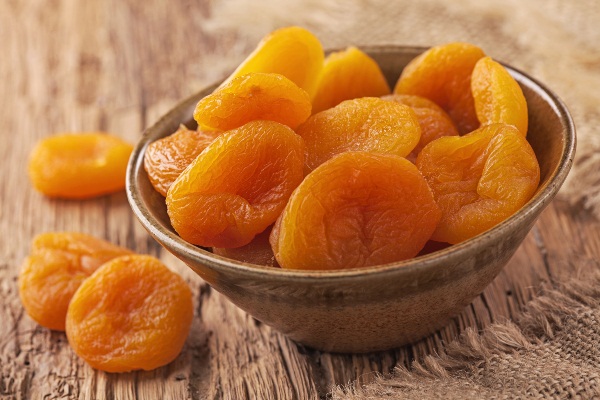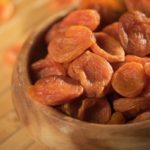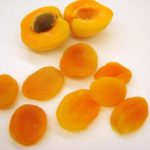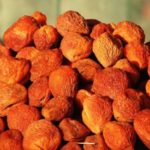Apricot fruits are attractive for the human diet with excellent taste and rich chemical composition. Therefore, they are popular in cooking, cosmetology and alternative medicine. Thanks special technology of harvesting and drying fruits it creates the opportunity to use the useful properties of the product all year round. In this article we will talk about dried apricots, what benefits and harm can bring to human health.
Table of contents
Useful properties and contraindications of dried apricot fruits
In addition to excellent taste, apricot fruits are sources of essential minerals and biologically active substances for the human body. They support the energy potential, protect against many diseases and increase the body's endurance.
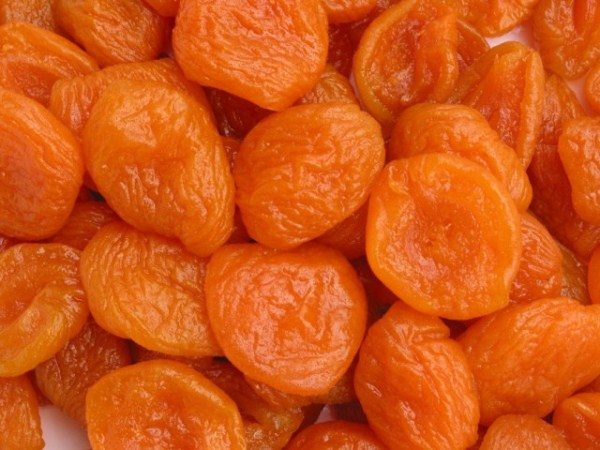
Nutritional value on 100 g:
- proteins 0.9 g;
- fat 0.1 g;
- carbohydrate 9 g;
- dietary fiber 2.1 g;
- water 86.2 g
The energy value 44 kcal.
Easily digestible carbohydrates of fruits are divided into sucrose and fructose. They are rapidly absorbed into the blood, after which the central nervous system receives a signal of saturation. This allows you to adjust the appetite, which is invaluable in various diets for weight loss.
Due to the content of coarse dietary fiber, apricot fruits have a mild laxative effect., additionally stimulating intestinal motility. This property is useful for colitis, chronic constipation and intestinal obstruction.
When consumed 100 g of the product enters the body:
- potassium 305 mg;
- calcium 28 mg;
- phosphorus 26 mg;
- magnesium 8 mg;
- silicon 5 mg;
- sodium 3 mg.
All these minerals are necessary for the full life of a person, especially useful for growing and worn out with age body.
The interaction of potassium and magnesium in the body supports the tone of blood vessels, prevents blood clots, regulates the rhythm of heart contractions. As a result, the endurance of the myocardium (heart muscle) increases, the work of the heart and the general hemodynamics of the body stabilize.. Therefore, apricots are recommended for the diet of people with diseases of the heart and blood vessels, as well as for hypertension.
The content in the fruits of apricot iron (0.7 mg) and iodine (1 μg) make them useful in anemia and diseases of the thyroid gland. Antioxidant property of apricot due to the content of beta-carotene (1.6 mg). The substance inhibits the formation of free radicals, which contribute to the transformation of healthy cells into malignant. Therefore, daily use of apricot is a good cancer prevention. The same property is useful to protect the body from the harmful effects of toxins entering with polluted air.
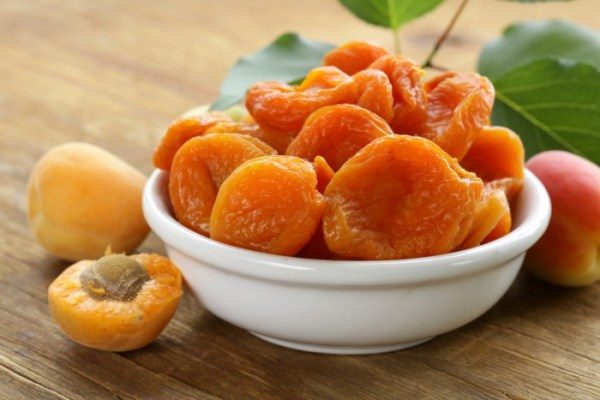
Apricot fruits contain significant amounts of vitamins C in humans. (10 mg) and E (1.1 mg). These organic compounds are needed to strengthen the immune system, normalize metabolic processes, blood formation, hormone synthesis, cell renewal of all body structures.
Harvesting and drying, types of dried fruit
The tradition of drying apricot has a long history. Previously, the fruit was dried exclusively in natural ways, leaving them on a tree or laying out under the sun's rays. Modern manufacturers use special drying equipment and apply additional substances that improve the safety of the product. The main suppliers of the product to the Russian market are Turkey and Tajikistan.
There are several types of dried apricot:
- Kajsa (called whole fruit without a bone);
- dried apricots (halves of fruits);
- apricot (fruit with bone).
- Kajsa - apricot fruits, dried whole without pits
- Dried apricots - dried halves of pitted apricots
- Apricots - dried fruit apricots with a bone
The process of harvesting dried apricot rather time-consuming. The initial stage includes harvesting by hand, carefully culling and storing before processing.
To produce dried apricots, seeds are removed from the fruit, cut in half and dipped in boiling water for a few minutes. This allows you to maintain the useful qualities of the product, to give the skin of the fruit a healthy shine. All halves of the apricot are joined by hand and laid out in a special thermostat. Here they are blown by the air and dry up. Drying out over 8-10 days, fruits are reduced in mass 4-5 times.
Useful properties of dried apricots for the human body
Dried apricot has many advantages relative to ripe fruit. It is isolated with a concentrated content of useful substances, the ability to apply the product all year round, while the consumption of fresh fruit is limited to the season. When drying apricot saved 85-90% useful properties. Due to the removal of water, the fruits become more high-calorie (232 kcal), and the content of 100 g of the product of vitamins and macro-and micronutrients increases by 3-4 times.
Application of dried apricots
The daily rate of dried apricot for an adult is 100-150 g. This fully satisfies the daily requirement of potassium, iron and beta-carotene.
Dried fruits are used for the treatment and prevention:
- gastrointestinal disturbances;
- diseases of the heart and blood vessels;
- detoxification of the kidneys;
- anemia, anemia;
- hypovitaminosis;
- endocrine disruption;
- hypertension;
- slagging of the body;
- eye diseases.
Regular consumption of dried apricots reduces the risk of heart attack and stroke, the formation of chronic syndromes of renal and heart failure.
The best recipes with dried apricots
In medical recipes can be applied dried apricots, Kaisu or apricot. Brightly painted dried fruits before use is recommended to soak in water on 15 minutes.
The use of dried fruit in diseases and disorders of the body:
- Vessels. Dried apricots (5 pcs.), Hawthorn and rosehip fruits (1 tbsp. Each) are poured with boiling water (0.5 liter) and insisted in a thermos for 10 hours. Strained infusion take 100 ml 3 times daily before meals. The course of treatment is 14 days. Folk remedy suppresses the processes of thrombosis, sticking of cholesterol on the walls of blood vessels.
- A heart. For the preparation of therapeutic mixture will need dried apricots (200 g), raisins (20 g), walnuts (50 g), honey (25 g), lemon juice (1 pc.). Finely ground ingredients are mixed with honey and lemon juice, mixed in a glass container. The mixture is kept for 3 hours. Take 2 tbsp. l spoons 1 time per day before breakfast. To improve the rhythm of the heart and strengthen the myocardium, you will need a continuous administration of the drug for a month.
- Constipation. Dried apricots (200 g), raisins (200 g), walnuts (100 g), grass of the Seine (50 g), honey (0.5 l), flaxseed (100 g) are passed through a meat grinder. The mixture is transferred to a glass container, stored in the refrigerator. Recommended daily use of 1 tbsp. l before breakfast for 5 days.
- Anemia, hypovitaminosis, strengthening the immune system. Dried apricots, prunes, raisins, figs, rosehips (100 g each) are poured with filtered water until completely submerged, soaked for 8 hours. After that, the mixture is passed through a meat grinder. Take 1 tbsp. l 4 times a day for 1 month. The paste is stored in a glass container in the refrigerator.
- Eyes. Dried apricots (3-4 pieces) pour boiling water (0.5 l), insist 3 hours. Accept 3 times a day on 100 ml. Infusion will help strengthen the vessels of the eyes. The same recipe will be useful for violations in the endocrine system.
- Cleansing the kidneys and the body. Dried apricots (10 pcs.) Pour boiling water (1 l) and insist 10 hours. 100 ml of the infusion is consumed before breakfast, the rest of the volume is distributed to receive during the day, gradually eating and fruit. The course of purification lasts 3 weeks, for this period exclude products of animal origin.
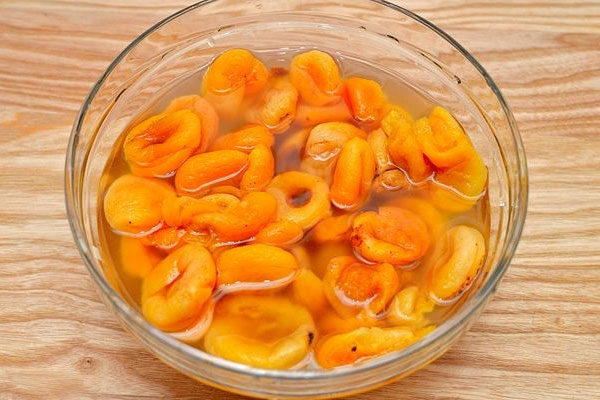
For the prevention of urolithiasis and strengthening the body will be useful compote. Cooking is very simple. For this, cleaned and washed dried apricots (300 g) are poured with water (2.5 l) and cooked for no more than 6-7 minutes on low heat. To make the drink more useful, sugar is replaced with natural honey. Compote will be useful for the daily diet of people of different ages.
The benefits and harms of apricot kernels
Inside the apricot kernels are kernels resembling almonds in taste, which in many countries are used to prepare delicious dishes.
Macronutrients in apricot kernels (100g):
- magnesium 196 mg;
- phosphorus 461 mg;
- potassium 802 mg;
- sodium 90 mg;
- Calcium 93 mg.
Iron content 7 mg. The vitamin composition of the product is nicotinic acid (PP) 4.15 mg. Energy value of the product 502 kcal.
Apricot kernels are widely known for oil, whose content in them reaches up to 60%. The main beneficial properties of apricot kernels are bound by fatty acids.: palmitic, oleic and linoleic. They have anti-inflammatory and antiarrhythmic properties, reduce cholesterol levels, and have a beneficial effect on the nervous system. Apricot kernels - a unique complex consisting of fatty acids and macronutrients for the treatment of cardiac and vascular pathologies.
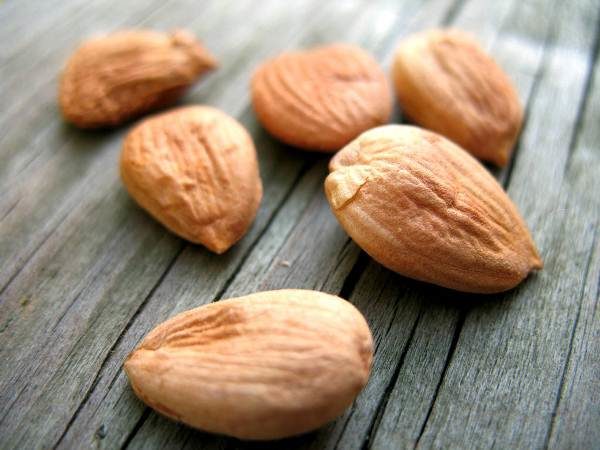
Apricot kernels contain dietary fiber that absorbs toxins in the intestines. It is useful for healthy microflora, an imbalance of which causes dysbacteriosis.
The composition of apricot seeds includes a substance benzaldehyde, which has analgesic properties. Regular use of the product relieves pain in case of arthritis, arthrosis and rheumatoid diseases.. Anti-inflammatory and mucolytic properties of nuclei help in the treatment of SARS, influenza, bronchopulmonary diseases, nephritis.
The composition of the nucleus contains amygdalin (AT17). Organic matter when in contact with malignant cells breaks down into hydrocyanic acid and benzaldehyde, substances with strong carcinogenic properties. Therefore, the product is often included in the diet of people with malignant tumors.
The composition of apricot kernels has a toxic effect on helminths. Traditional medicine recommends using them as an anthelmintic.
Medical recipes
To strengthen the immune system and prevent heart disease, apricot kernels can be included in the daily diet without treatment. It is important to know: daily rate of an adult 20 gand children 10 g. With an increase in the recommended amount, the harmless amygdalin threshold for the body will increase. This can turn into poisoning.
Recipes:
- Arrhythmia. Crushed kernels (20 pcs.), Ground lemons (0.5 kg), honey (0.5 l) are mixed and kept for 2 days in a cool place. Mixture take 1 tbsp. l before breakfast and before dinner. The course of treatment is 14 days.
- Dry cough. Fried kernels (250 g) are poured with water (0.5 l) and boiled for 1 hour. After that, add the kernels of walnuts (250 g), evaporate the liquid, add honey (0.5 l) and keep on slow fire for 3 minutes. The mixture is taken on an empty stomach 2 times a day for 1 tsp. to ease the state.
- Inflammation of the airways. Dried kernels are ground to powder. For use, the powder is dissolved in warm milk, distributing 20 g of product for the whole day.
- Dermatitis. To reduce inflammation, relieve itching and soften the crusts, it is necessary to lubricate the problem areas with apricot oil 3 times a day.
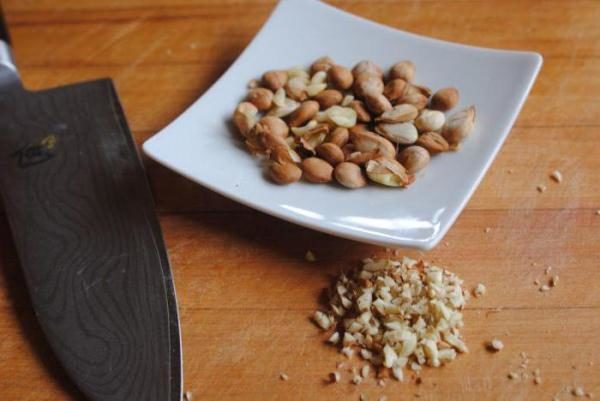
With helminth infections Recommended daily use of raw apricot kernels, which increase the toxic effects of basic drugs.
Apricot kernels not recommended for people with hypersensitivity. In case of chronic pathologies, it is necessary to consult a doctor.
The widespread use and significant properties of apricot for a person allows him to be regarded as a valuable culture. Apricot has industrial value for many countries, mastered by amateur gardeners, and the assortment of culture is constantly being improved by breeders. Therefore, we can enjoy fruits of different flavors and acquire a quality product.
